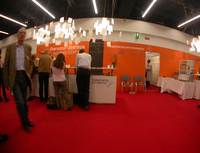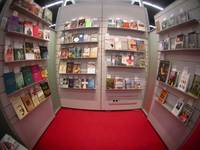Übersetzerzentrum bei der Frankfurter Buchmesse. Mit Kreide geschrieben: “Literaturnobelpreis 2004 Elfriede Jelinek”.
Bücher mit Übersetzernamen.
Zu Jelinek siehe www.perlentaucher.de und Wikipedia.
The photos show the translators’ area at the Frankfurt Book Fair. The words in chalk announce that Elfriede Jelinek has been given the Nobel Prize for Literature. The books all show the names of the translators, on cards. The translators’ area also has a space with chairs for presentations to an audience, and it’s beside a coffee station, so it looks suitably large and professional.
Some observations on Jelinek: she has recently translated and adapted, together with Karin Rausch, ‘The Importance of Being Earnest’ (‘Ernst ist das Leben (Bunbury)’) and is working on ‘An Ideal Husband’. She has also translated Feydeau and co-translated Pynchon (list of works).
As I was in Frankfurt all day, I missed interviews and discussion on TV except for about ten minutes. The anger and narrowmindedness of some Austrians when confronted with something they don’t like is astonishing and may be untranslatable. It reminds me of the Nurembergers standing in front of the rabbit sculpture that commemorates, with irony, Dürer’s hare. It used to be fun to stand there and hear the complaints. But I haven’t heard this amount of personal affront in Franconia when it comes to literature.
I didn’t realize how much autobiographical content went into ‘The Piano Teacher’ (‘Die Klavierspielerin’). According to the German biography on Wikipedia, she was sent to a convent school, and from the age of 13 she studied organ, piano and recorder at the Vienna Conservatory (having previously had piano, guitar, flute, violin and viola lessons) and at the same time attended a normal grammar school (Gymnasium). She married in 1974, and I presume the novel is based on the idea of what might have been if she had continued her mother’s plan.
Jelinek was born in Mürzzuschlag: I remember a translator once asking on a mailing list how to translate it (Zuschlag is a translatable German word, but Mürzzuschlag isn’t).



well, the “mürz” is a river in styria, tributary of the “mur”. you reminded me that i’d always been curious how the name “mürzzuschlag” came about. btw, since it’s a name one wouldn’t *need* to translate it… or yes? (somehow i’ve never been comfortable with the idea of translations for personal or geographical names.)
Thanks very much – I couldn’t be bothered to research it. Is it a diminutive of Mur, I wonder. (In Fürth, the Rednitz and the Pegnitz meet and form the Regnitz!)
Someone just thought this was some kind of obscure customs duty with a definition in Austrian German. Once it was revealed as a place name it didn’t need to be translated. Just today I read a mailing list question, ‘I can’t find a translation into Spanish of reblochon in any of my dictionaries’.
Translating of proper names sounds like a bad idea, but it is quite a minefield. Back to an Austrian book by Otto Back, Übersetzbare Eigennamen. Eine synchronische Untersuchung von interlingualer Allonymie und Exonymie (not quite sure what that means offhand).
found something…
1227 – Der Minnesänger Ulrich von Liechtenstein nennt in seinem Gedicht “Frauendienst” (Handschrift Bayrische Staatsbibliothek, II-1487/50) erstmals unseren Ort “murzuslage”.
from: http://www.muerzzuschlag.steiermark.at/politik/geschichet_1227_1292.htm
i suggest the meaning is “liegend an der muerz” or murzus as it may have been called at the time.
amusing though that this early name is so apt when you consider the meaning of the word “zuschlag” and muerzuschlags later history (found following on the OeBB website):
Im 14. Jahrhundert erlangte Mürzzuschlag eine Monopolstellung in der Eisenerzeugung und bewahrte die Stellung als Handels- und Gewerbezentrum des Mürztales auf lange Zeit. Nach der Eröffnung der Bahnstrecke Mürzzuschlag Graz 1844 wurden alle bis dahin mit Pferdewagen über den Semmering transportierten Güter und Personen hier auf die Eisenbahnzüge verladen. Als Eisenbahnknotenpunkt wurde Mürzzuschlag eine richtige Eisenbahnerstadt.
Is this Nobel literature prize a PC – politically correct – award to someone whose experimental writings are considered in Austria to be over-rated?
Elfriede herself as a withdrawn, anti-Austro-Nazi authoress acknowledges as much, so is sending the head of Rowohlt Theater-Verlag, Corinna Brocker, to collect the prize for her.
She also admits that, had Austrian colleague Peter Handke been awarded the prize (hint, hint), it would have been primarily as a writer and not as a token man.
Kohlehydrat: thanks. I couldn’t find out any more, nor did the online Lexer MHD-Taschenwörterbuch throw up anything else. If the zu were a modern zu it would be a MHD zuo. So I’m sure your interpretation is right.
I don’t think it’s a PC decision. I think they chose her because of the current Austrian government. Must get to the Deix exhibition in Frankfurt.
Lisa Neun, who blogs from Erlangen but is Austrian, had a nice little story from her schooldays where her class met Jelinek.
http://l9.primary.at/l9log/archives/2004_10_07.html#000438I don’t know when the Nobel Prize for literature has ever rewarded literature above politics. I really quite like Jelinek, but she can be heavy going. She says herself that Handke perhaps had a better claim from the literature point of view; and Bernhard is dead. I would rather read more Jelinek than Handke but I think it’s true, she wouldn’t be the first expected choice if you look at the whole world and some of the other potential candidates. But she does write literature, which is more than you can say for some winners, I should think.